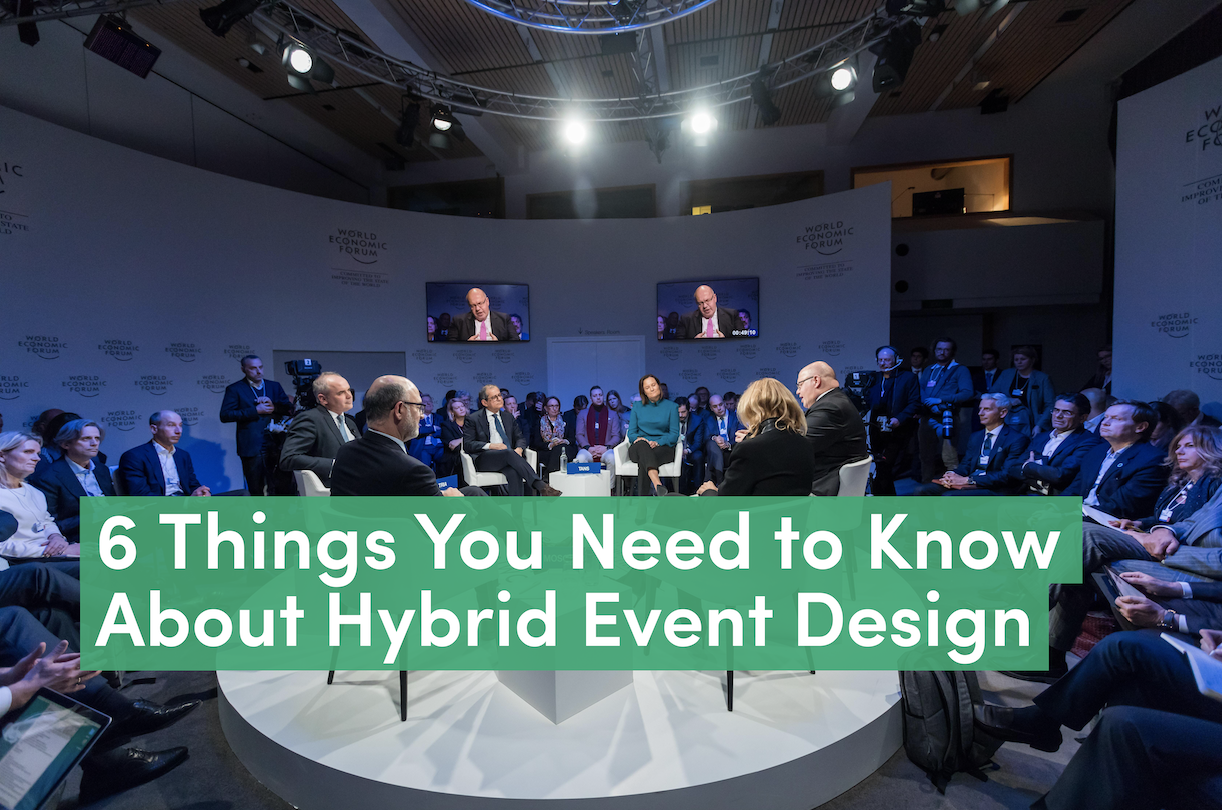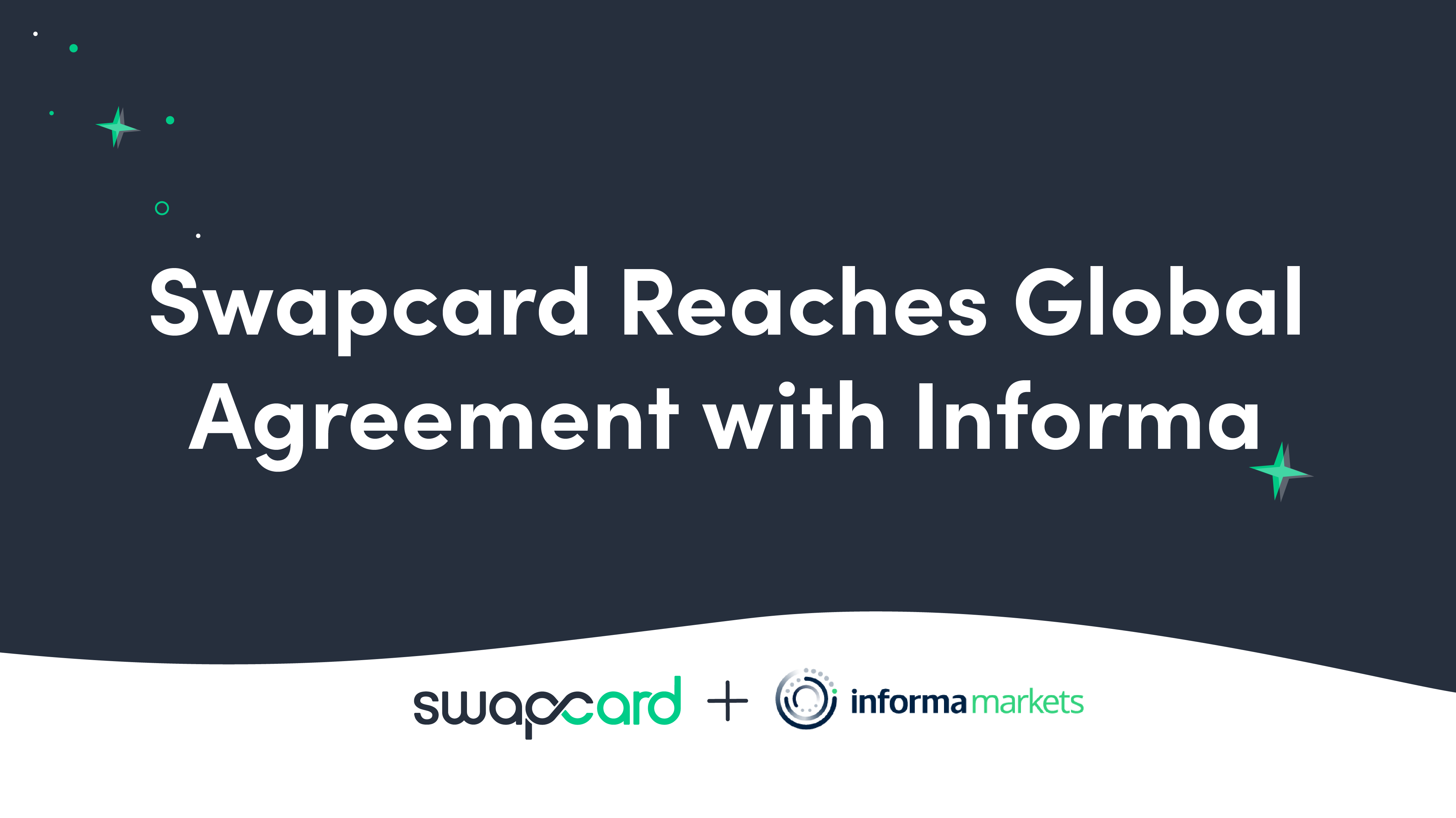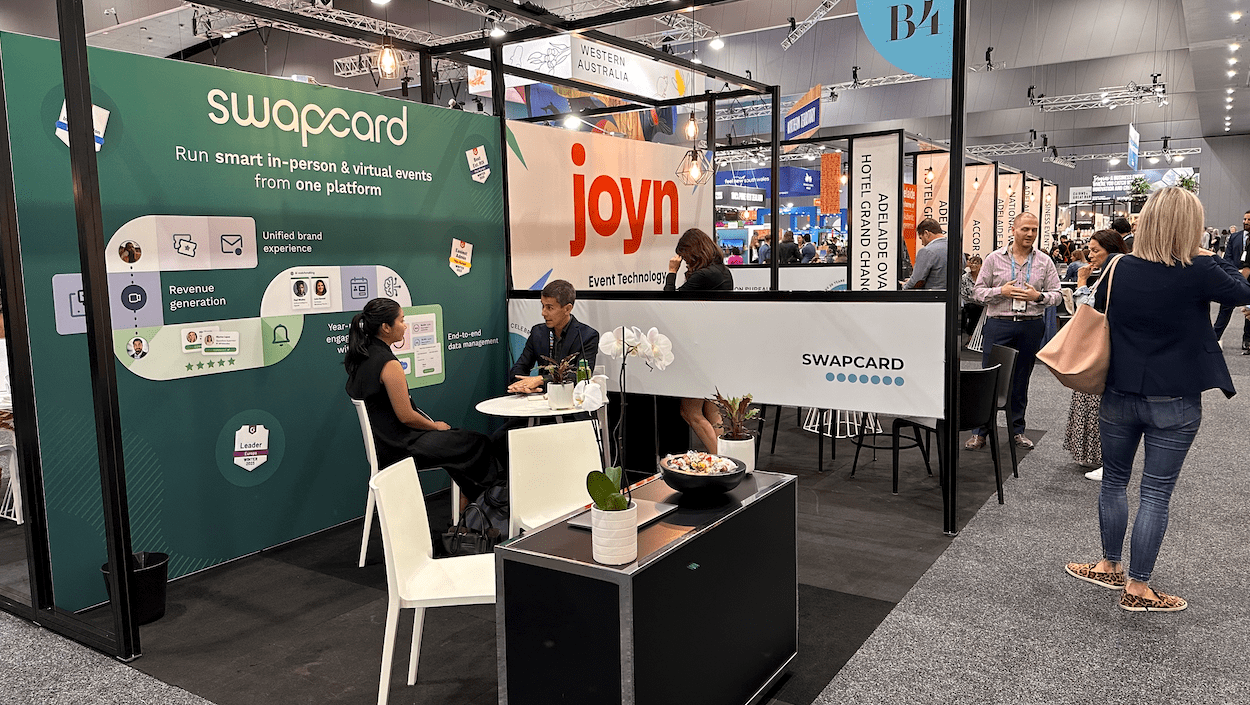June is Pride month and Swapcard is celebrating LGBTQ+ voices.
Although one month is clearly not enough, it does provide the opportunity to reflect on how far we’ve come and how much work still needs to be done.
We’re doing some introspection and encouraging our peers in the events industry to do the same.
Let’s use the start of Pride Month as a moment to reflect on how we can be increasingly committed to diversity and inclusion in the future of our industry so that it becomes a way of life instead of a box to be checked off a list.
Our peers’ stories speak for themselves. We hope that by listening to their first-hand experiences, we can collectively take concrete steps towards a more inclusive events industry, this month and every month in the future.
“The first step is to understand what diversity and inclusion is, and note that they are not one-and-the-same. Change behavior by actively seeking to ensure racial justice in the workplace. When you create a diverse team, it ensures you get input from various sides and creative minds. When you hire vendors of different skin types, you get generational wisdom that you would never receive had you not placed them on the project.” - Andrew Roby, owner of Andrew Roby Events, in BizBash 2020.
Meet our awesome contributors:
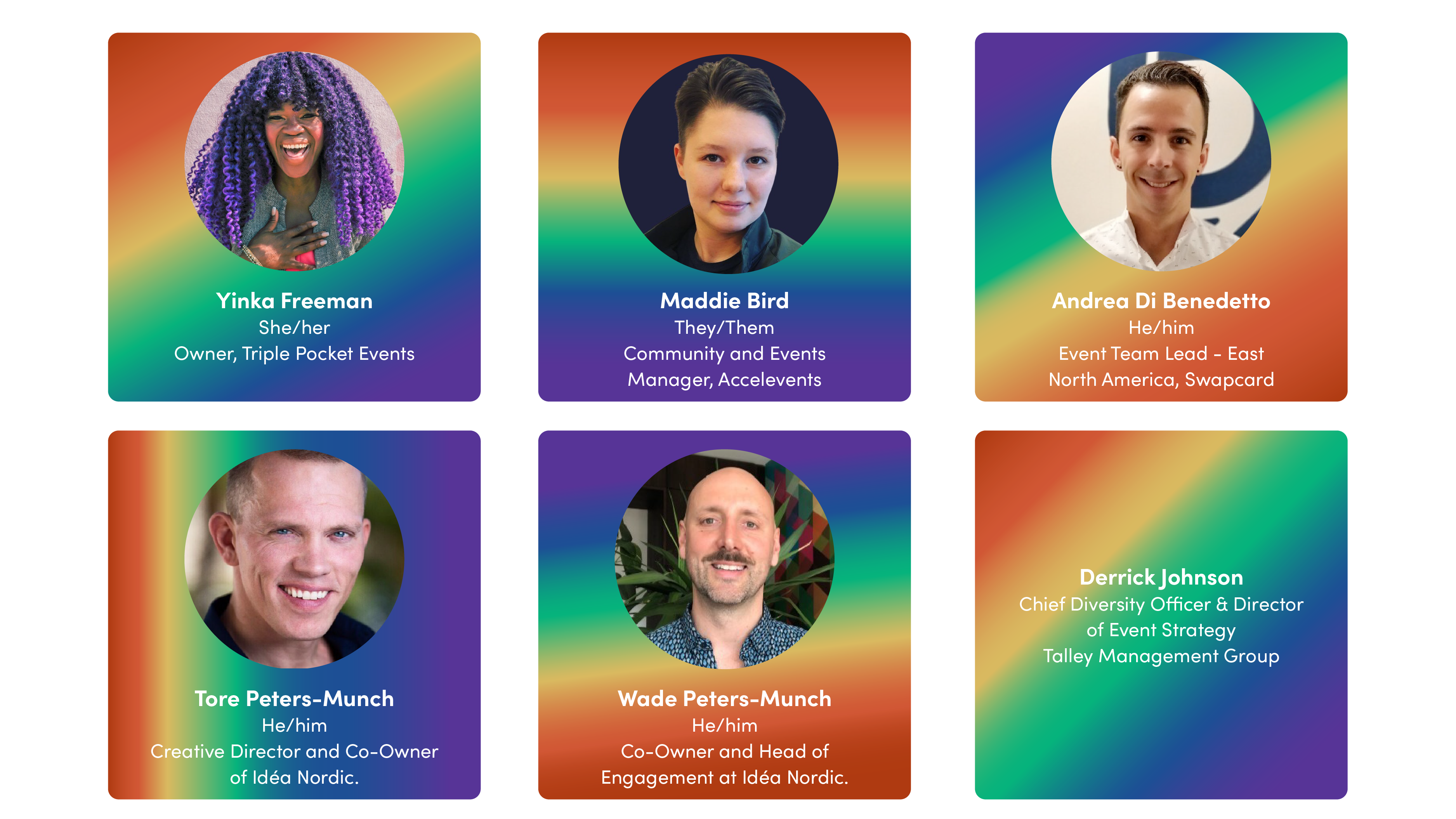
Have you faced challenges as a member of the LGBTQ+ community working in events?
Andrea Di Benedetto, He/Him
"I have not faced any challenges per se, but I did feel uncomfortable depending on the countries I had to travel to for work. Dubai at first (though I soon realized that I was safe there so I'm not worried about going back there and am eager to return) and Saudi. I was never directly at risk in Saudi but I wasn't feeling safe at all there. Even though it's not written on my face that I'm gay, I thought that if someone learned about it, it could be dangerous."
Maddie Bird, They/Them
"I have definitely faced challenges as a non-binary person, especially one who most people assume is a woman. This usually comes in the form of garden-variety misogyny, the type of harassment that any woman in the industry has experienced. However, as a queer person the biggest challenge for me is getting people to understand, respect, and then remember to use my pronouns. I go by they/them, rather than she/her or he/him, and in the past, many people I worked with and for were either confused by that or outright hostile towards me because of it. It has gotten better over time, as I have become more confident about standing up for myself, and correcting my colleagues when they get my pronouns wrong.
I will also say that, because I am a white person, the discrimination and challenges I experience are much less than those of queer people of color. I always try to use my privilege to lift up those who are more marginalized than me, and I encourage my colleagues to do the same."
Wade Peters-Munch, He/him & Tore Peters-Munch, He/Him
"Overall, we haven’t experienced any significant challenges that have stopped us from running successful events. We live in a country that is relatively tolerant of people’s differences. We used to ‘tone down’ the gayness when we worked with people from less tolerant countries, but we don’t do that anymore. On a personal level, there are some countries that we travel to, that we have to pretend to be straight, as LGBTQI+ people can be put in jail. Wade was previously more conscious of not being 'too gay' with potential clients, having had to do the same in the corporate community for many years, but the events industry is a more accepting community.
In many ways, being from the LGBTQI+ community is seen as an advantage in events, because ‘being creative and colourful’ is one of our positive stereotypes."
Derrick Johnson, He/Him
"As a black gay cisgender male, my challenge in working in events and life has brought my authentic self to situations. We have built systemic walls of oppression in just about all parts of life, setting expectations for individuals to conform to particular stereotypical identities. The event industry is no different. Some planners require attendees to show up to events in specific dress codes, but this sometimes restricts how I like to express myself through attire. If dress codes are necessary, for whatever reason, they should be creatively articulated to give the person the freedom to bring their personality into their clothing. Also, when I first entered the industry, many masculine traits dominated activities, which sometimes made me feel excluded because I did not have any interest in many of them. Not everyone plays golf.
The opportunity we have through planning experiences is to connect audiences in fun and creative ways. The business events community should diversify the activities it offers to give people a wide variety of options to connect with similar people. Finally, as a single member of the LGBTQ+ community, participating in open events with spouses/partners has been very awkward. Before my confidence, I was timid about bringing someone of the same gender because of the fear of being judged. We do not frequently see it unless participants get a friend of the same gender. As we continue to diversify our audiences, planners need to understand why certain people are not actively and fully participating in events. Leveraging qualitative and quantitative data to see where the LGBTQ+ community is inactive and active will allow the organization to explore why."
As a Black person in the LGBTQ+ community, what are the intersecting and multiple layers of challenges you face?
Derrick Johnson, He/Him
"Being from multiple marginalized communities, I have found that my empathy towards diversity is higher than most. I believe the LGBTQ+ community and the black community (heck, all groups) intersect at humanity and are seen less. Both the black and LGBTQ+ communities continue to face bigotry and injustice around the world. People fear the unknown. The more our world continues to elevate diverse voices in positions of influence and make the unfamiliar more common, the closer we get to creating a world where diversity is celebrated, people feel included in all parts of life. Their foundation for learning, sharing, and connecting is equitably distributed."
Can you share a story of when you felt supported at work
Andrea Di Benedetto, He/Him
"When most of Swapcard came to our wedding party in the midst of a pandemic last summer. I feel very supported by everyone working at Swapcard."
Maddie Bird, They/Them
"My first event role was as a barista in college. During that time, I came out as non-binary and felt extremely supported at work. Many of my coworkers were also queer, and my manager had a strong, consistent policy to make sure no one was misgendered at work. She always made sure to confirm new employees’ pronouns, let everyone else know how to address that employee, and ensure that employees felt comfortable coming to her with any issues. This was a huge advantage for me when I first came out of the closet because I had the space to assert myself and my identity as a queer person. Later on, when I faced confusion and hostility in other companies, I was able to provide a framework for those companies to change their policies and make it easier for future queer employees. I have always enjoyed working closely with managers and HR to help them understand how to make the workplace feel safe for me, and my colleagues. In January, I joined Accelevents, and the talent managers here went above and beyond to make sure that my pronouns were known and respected throughout the company. This makes it easier for me to stick up for myself and for other non-binary or queer people when I have the chance, because I know my company and colleagues support me 100%."
In your role (one of two!) as Chief Diversity Officer, what are your professional advice and secrets for making a company more inclusive?
Derrick Johnson, He/Him
"As the Chief Diversity Officer and Director of Event Strategy at Tally Management Group, my role is to connect organizations' diversity, equity, and inclusion initiatives with a sustainable vision of liberating experience for all. To solve any problem, you must first identify it, followed by analyzing/collecting data and being transparent about the findings. This openness in sharing information, good and bad, is vital in driving towards social transformation. We must create environments where people can bring their whole authentic selves and share."
Anything you wish peers in the event industry knew about the LGBTQ+ community?
Andrea Di Benedetto, He/Him
"It's little things like "is your wife in France too?" or similar questions that kind of make me uncomfortable as I feel like I need to 'correct' people. Sometimes, I just don't even want them to know about my personal life and the fact that I'm gay. Working with people from all around the world, we face different cultures and when I'm not sure about how people would react, I just prefer not disclosing it (not like it's their business anyway or like it should matter)."
Maddie Bird, They/Them
"There are so many different ways for a person to be part of the LGBTQ+ community. I wish people would understand that being queer doesn’t just mean being 'gay,' or being attracted to the 'opposite gender,' but that gender and sexuality are two, unique, and completely separate spectrums. When I tell you my pronouns are they/them, please don’t ask me who I’m attracted to, or what my spouse thinks about my gender identity. Just refer to me as they/them! Also, please don’t tell trans people “I’m trying, but it’s so hard,” to refer to them by their proper pronouns. We know it’s hard, we grew up learning the same gender binary that you did; when you dwell on it, it just makes it harder for us to correct you in the future. Instead, take time to practice using your colleagues' pronouns correctly, and when you mess up, quickly correct yourself and move on. Call out other people when they mess up your colleagues' pronouns, and help the community be more inclusive as a whole."
Wade Peters-Munch, He/him & Tore Peters-Munch, He/Him
"If you are also part of a minority or were ostracized as a kid, you probably have had similar experiences. Wade used his gayness as a reason to leave his hometown and meet new people. Tore used it to open his mind and build his creativity. When you are rejected by your family for being yourself and told that there is something wrong with you from an early age, you become a fighter.
I want people in the event industry to know that minorities are resilient people."
Derrick Johnson, He/Him
"It is 2021, and LGBTQ+ community members still do not have the same rights as their heterosexual peers. We must stand together and meet at the intersection of humanity to liberate our world of injustice, discrimination, and hate."
Do you have any advice for members of the LGBTQ+ community who are looking to join the events industry?
Andrea Di Benedetto, He/Him
"Just be yourself and don't lie about who you are from the beginning. I'm not saying come to the office riding a unicorn (but if it's your preferred way of travel, go ahead, at least it's sustainable) but stay true to yourself. Also, be sure that the company you'll be working for or with is accepting of our community and willing to defend it."
Maddie Bird, They/Them
"Just understand that it is challenging, like any industry, especially because of how customer-facing it can be. However, stick up for yourself, because the climate is improving, and more and more people want to learn how to be inclusive and supportive of LGBTQ+ people."
Wade Peters-Munch, He/him & Tore Peters-Munch, He/Him
"If we could change anything, we would have been a more authentic version of ourselves from the start of our careers. Put your energy towards something more useful than trying to create a different version of yourself."
Yinka Freeman, She/Her
"Come starting every position as your true self, believe it’ll make your life a lot easier and happier. The events industry is big yet can be quite small at the same time where we all end up knowing each other, so you want to make sure that you are being true to who you are. Have that trans pride pin or rainbow flag proudly displayed in your office!"
Derrick Johnson, He/Him
"Through business events, we have the opportunity to drive global, social and economic transformation in communities, one connection at a time. Our industry is one of the only ones that touch all others. We have the opportunity to be examples for all of humanity, showing the talents, passion, and drive within.
Any associations or charities that you'd like us to link to so our readers can support?
Andrea Di Benedetto, He/Him
"Le Refuge is a French association that helps young LGBTQ+ people find shelter if they are forced out of their homes by unaccepting parents."
Maddie Bird, They/Them
"I support the Coalition For Black Trans Economic Liberation in Philadelphia, whose mission is to provide funding and support to Black, transgender Philadelphians. The Coalition always welcomes funds, but I also like to encourage people to look within your communities, and see what local organizations are providing services to the LGBTQ+ community on the ground in your city!"
Wade Peters-Munch, He/him & Tore Peters-Munch, He/Him
"The Polish LGBTQI+ community is experiencing a rise in hate crimes due to the ‘LGBT-free zone’ policies being introduced. There is an organization called KPH fighting for the rights of LGBTQI+ people in Poland. If you are in Poland please help them, or donate."
Yinka Freeman, She/Her
"I work very closely with San Diego Pride as a lead volunteer and a Pride Ambassador to help raise funds for their many year-round programs. I absolutely love working with San Diego Pride because they focus on the educational and activism aspects of our community just as much as they focus on the LGBTQ+ events they put on."
Derrick Johnson, He/Him
The LGBT Meeting Professionals Association (LGBT MPA) is an organization committed to connecting, advancing, and empowering LGBT+ meeting professionals.
Any resources on how to improve diversity in our industry you'd like to share?
Maddie Bird, They/Them
"Rethink the way that you do hiring, first and foremost. Does the position really require a bachelor’s degree, or would equivalent experience work just as well? Who do you take referrals from? Where do you post your job listings? Who do you hire to help with outsourced recruiting? These are all questions that we need to ask when we are looking for new co-workers or employees.
For professionals in the UK, Diversity Ally is a wonderful resource. They have a free guide to implementing their industry benchmarks which you can download here."
Yinka Freeman, She/Her
"Many Prides around the world rely on volunteers like myself to help create beautiful events that celebrate the Queer community, reaching out to those organizations is a great first step. Many of the people that volunteer have lots of great professional experience. Take a look at Yinka’s events company"
Wade Peters-Munch, He/him & Tore Peters-Munch, He/Him
"Here is a map which people might find interesting: SEXUAL ORIENTATION LAWS IN THE WORLD."
Conclusion
Listening to our colleagues and giving them a platform to share their experiences is the first small step we can take towards making substantive changes within the events industry. Even though they might not be looking for accolades, we want to celebrate their contributions!
We hope that by using our platform to elevate organizations that are putting in the work to help the LGBTQ+ community directly, we are doing our part to raise voices that are often marginalized and advance meaningful conversations that are long overdue.
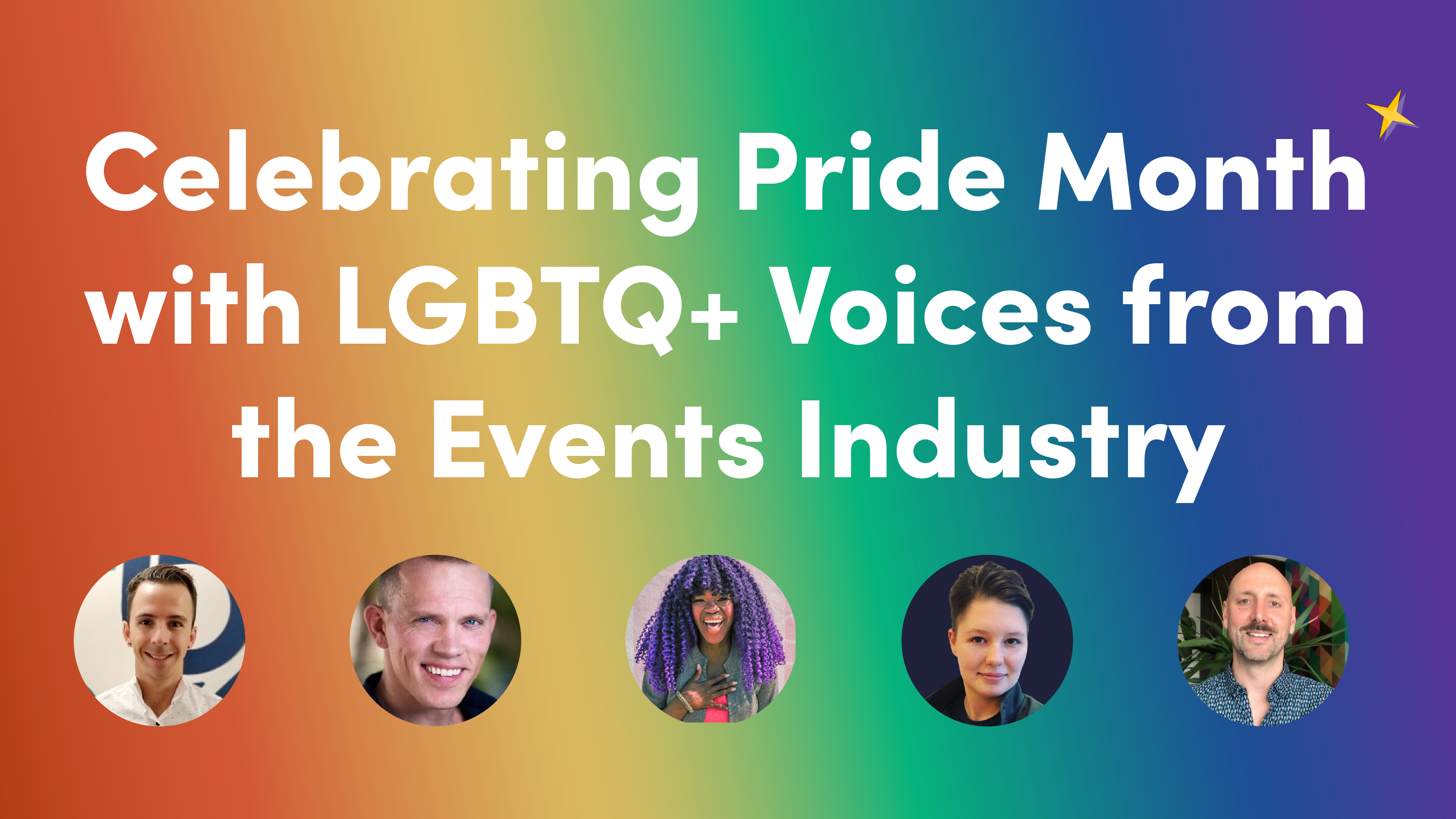
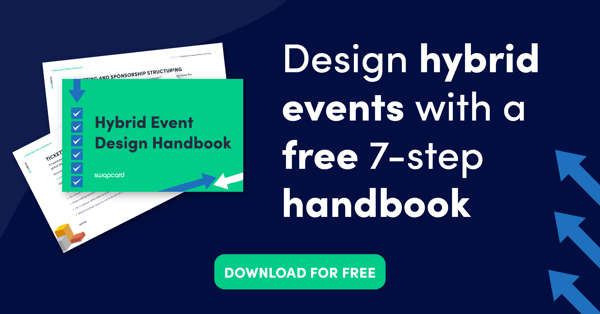
-1.png?width=600&name=Email-Banner-HydridIsNoW-Mockup%20(1)-1.png)
.png?width=600&name=Morning%20Habits-Cover-Title%20(1).png)
